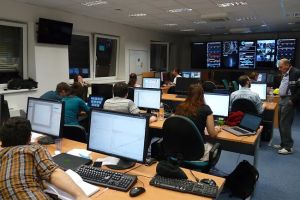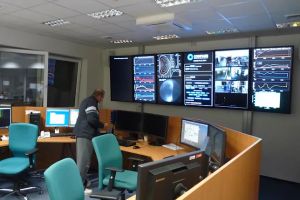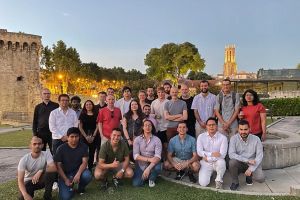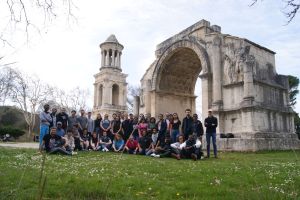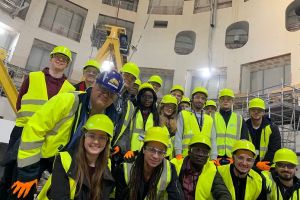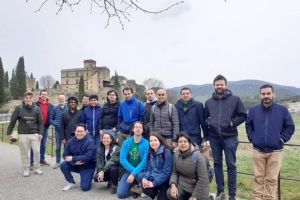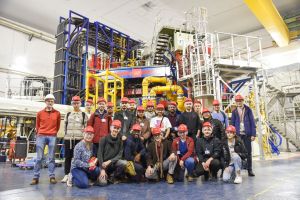Overview
Nuclear fusion
Magnetic confinement fusion is a field aiming at delivering sustainable, carbon-free energy within a few decades, based on the fusion of atomic nuclei. Led by world-class research institutions and industry, it is a worldwide "big-science" endeavour of unprecendented scale. The field is rooted in the rich domain of plasma physics and involves a wide variety of engineering disciplines, ranging from materials science to robotics.
The domain of fusion research and development has changed gear since the ITER Organisation was set up and started bulding the ITER device in the EU. As the fusion community makes pace towards commercialization, the focus is shifting from an academic and fundamental perspective to activities driven by technology and industry.

View inside the JET tokamak, with the plasma superimposed on the right - Credit EUROfusion
About the master programme
The Erasmus Mundus Joint Master Degree (EMJMD) FUSION- EP, created in 2006, aims at training the next generations of magnetic confinement fusion physicists and engineers. To that end, FUSION-EP provides high-level research-oriented education and a well-integrated cultural experience within an international consortium of institutions leading the interdisciplinary domain of magnetic fusion - a field of crucial importance to the problem of world energy supply.

The ITER construction site by night - Credit ITER Organization
The combined and harmonized teaching and research activities are coordinated among eight partner universities in Belgium, Czech Republic, France, Germany and Spain. A uniquely comprehensive insight into the cutting-edge R&D in nuclear fusion is guaranteed by the broad range of expertise available in the Consortium.
The FUSION-EP curriculum is organized in two periods of increasing specialisation, each in two different countries, along two distinct tracks: Fusion Sciences and Fusion Technology.
Internationalization, multidisciplinarity and student mobility are inherent parts of the programme structure and philosophy. There exist several student and alumni initiatives leveraging valuable connections within a global network.
In addition to its strong internationalization, a unique feature of FUSION-EP is the stimulation of the students' learning performances by innovative training methods. One on-line and three mobility joint sessions are implemented throughout the curriculum, during which the students practice their academic knowledge in research situations. They enrich their set of transferrable skills by working in a multicultural environment. Each summer a four-day event is a further opportunity for the students to meet each other, as well as lecturers and visiting scholars.
The fourth semester is focused on the application of the learning outcomes in a professional situation. This placement period is used to prepare the master thesis at a partner or in industry. The defense of the students' master theses is held in public during the Summer Event, attended by all students.
Some statistics
70%
PhD studies
Nearly 70% of the FUSION-EP alumni pursues doctoral studies after graduation.
85%
Job search
In a 2016 survey, 85% of respondents indicated that the obtained master diploma was very helpful to find a job.
25%
Fusion career
In the long run, 25% of the alumni pursue a fusion career, while about a third goes on in the broader field of engineering in the nuclear sector or outside. The majority of the remaining alumni goes to information technology.
Alumni stories
-
Abha (2022-2024)
Being part of the FUSION-EP programme was a transformative experience for me. The exposure to such diverse scientific environments and the excellent guidance I received from you all played a major role in preparing me for this next step. I’m thankful for the support, patience, and encouragement e... -
Chibueze (2022-2024)
To me, FUSION EP is more than an academic programme. My first year was in Stuttgart with lectures on foundations of plasma physics and fusion research. I made good friends and encountered some professors who later became mentors. The second year and thesis internship were in Prague. New friends, ... -
Federico (2022-2024)
From the very first time I heard about the Fusion-EP programme, I knew that I wanted to enroll in it. My experience ended up being even better than what I expected. The diversity of sites makes it possible to focus on what interests you the most and assisting to the different events is a perfect ... -
Hina (2022-2024)
I am deeply grateful to the FUSION-EP master’s program which has been one of the most rewarding experiences of my life. This incredible opportunity has not only allowed me to grow academically and professionally but has also enriched me socially and morally. I have gained the confidence and prepa... -
Fernando (2021-2023)
Discovering the field of nuclear fusion through the Fusion EP programme has been an amazing experience. The small course groups and close collaboration with peers and active researchers have really made me feel part of the European fusion community over the past two years. The joint events were e... -
Ewout (2021-2023)
The FUSION-EP programme granted me the unique opportunity of studying in an inspiring field which will play a key role in the clean energy revolution currently underway, thus providing plenty of professional opportunities both within industry and research. Additionally, I got to do so whilst expe... -
Paula (2021-2023)
I am profoundly grateful for the opportunity that the Fusion-EP programme has provided me. This master's programme has had a profoundly positive impact on both my academic and social life. Not only have I acquired a wealth of knowledge in plasma physics and nuclear fusion, but I have also had the...
FusionEPtalks
FusionEPtalks is a series of online lectures by alumni and lecturers, organized by the FUSION-EP alumni. Talks are available on YouTube. Below are a few examples.
-
Developing Tungsten-diamond composites for fusion applications, by Anneqa Khan
May 5, 2022 Abstract: WEST is a full W tokamak with an extensive set of diagnostics for heat load measurements especially in the lower divertor. It is composed by infrared thermography, thermal measurement with thermocouples and fiber Bragg grating embedded few mm below the surface. Associated t... -
MHD modelling for liquid metal systems and components, by Alessandro Tassone
May 12th, 2022 Abstract: Liquid metals are promising fluids for applications in breeding blankets (BB) and plasma facing components (PFC) but, owing to their high electrical conductivity, tend to behave in bizarre and counter-intuitive ways when exposed to the intense magnetic fields which are...


Contact us
This email address is being protected from spambots. You need JavaScript enabled to view it.
Powered by eMundus
